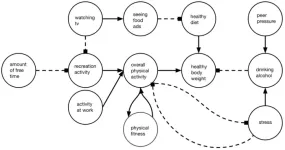(Press-News.org) In eastern Africa, malaria parasites have developed resistance to artemisinins, the backbone of current treatment regimens, a development that could dramatically worsen malaria’s impact if partner drugs fail in the future.
The finding from studies in Eritrea was reported Sept. 28 in the New England Journal of Medicine by a team of researchers led by Didier Ménard, PhD, of the Université de Strasbourg/Institut Pasteur in France and including Columbia University microbiologist David Fidock, PhD, the C.S. Hamish Young Professor of Microbiology & Immunology and professor of medical sciences in the Vagelos College of Physicians and Surgeons.
Treatment of malaria depends on artemisinin drugs paired with a partner antimalarial. These drug combinations have been highly effective treatments for non-severe cases since the early 2000s and usually clear the malaria parasites from a patient’s blood after three days of treatment.
But Plasmodium falciparum parasites are developing drug resistance, which threatens to roll back the progress made against malaria between 2000 and 2015, when deaths from the disease in Africa dropped by 66%. Resistance to artemisinins first emerged in Southeast Asia in 2009, followed soon after by resistance to partner drugs. By 2016, the treatment failure rate in some parts of Southeast Asia had reached 85%. Resistance to the artemisinin components is caused by mutations in the P. falciparum parasite gene Pfkelch13.
With drug-resistant malaria, what happens in Southeast Asia often occurs in Africa with a decade-long delay, either because resistant parasites cross over to Africa or the same mechanism of resistance takes longer to emerge and establish itself in high-transmission African settings. More than 95% of all deaths from malaria occur in Africa, and any increase in drug resistance there is alarming.
The new finding: drug resistance in the Horn of Africa
In the new study, Ménard’s group and colleagues from the Ministry of Health in Eritrea assessed the effectiveness of artemisinin-based combination therapies in nearly 1,000 patients in Eritrea between 2016 and 2019.
The researchers found that effectiveness of the drug therapy declined during that time: The drugs failed to clear parasites in 0.4% of patients in 2016, rising to 4.2% in 2019, crossing the WHO threshold for declaring resistance.
The researchers also found that by 2019, about one in five patients was infected with artemisinin-resistant Pfkelch13 mutant parasites.
The Columbia team led by Fidock then performed genetic experiments with parasites grown in a laboratory and showed that the most common Pfkelch13 mutation identified in Eritrea is directly responsible for the artemisinin resistance.
The question now is how widespread the mutations in Pfkelch13 are across Africa. “We’re not looking at a new strain that’s recently taken over. It’s just taken this long to detect,” Fidock says. “Central and western Africa have high malaria burdens, but we don’t know what’s happening there and need more genetic surveillance and therapeutic efficacy studies.”
Parasites also escaping detection
The situation in Eritrea is even more alarming, the study found, because many of the parasites harbor genetic deletions that make the parasite undetectable with the most common rapid diagnostic test for malaria.
About 17% of patients in Eritrea would test negative for the disease with this test, which is no longer used in Eritrea but is commonly used throughout Africa. The spread of these test-negative parasites would pose serious impediments to proper diagnosis.
“That means if somebody goes to a clinic with symptoms, but the test comes back negative for malaria, they’re not going to be prescribed the right treatment,” Fidock says. “Their symptoms may get worse, or they may die. This risk is compounded by the fact that artemisinins are used alone to treat severe malaria, where drugs have to be delivered intravenously. Parasites with the mutant Pfkelch13 gene may not be quickly eliminated, increasing the risk of a fatal outcome. Clinicians across the region need to be aware that patients who test negative may indeed have malaria.”
Why it matters
“Unfortunately, our study has revealed that resistance has established a firm foothold in the Horn of Africa, which makes it more likely that the partner drugs will fail next because they are not being eliminated by the artemisinin, and malaria cases and deaths may start to spike,” says Ménard.
The situation is not yet catastrophic, because the parasites have not developed resistance to the partner drugs used in artemisinin therapy.
“But if those partner drugs fail, the situation could quickly worsen,” Fidock says. “There are enormous efforts underway to develop new drugs, but right now there are very limited options available.”
More information
The findings were published Sept. 28 in the New England Journal of Medicine in an article titled “Increasing Prevalence of Artemisinin-Resistant HRP2-Negative Malaria in Eritrea.”
Other Columbia University authors: Barbara H. Stokes and Kurt E. Ward.
The research was supported by the Bill and Melinda Gates Foundation through the WHO (grant OPP1209843); the Global Fund to Fight AIDS, Tuberculosis, and Malaria through the Ministry of Health, Eritrea; the Institut Pasteur; the French Government (Agence Nationale de la Recherche), Laboratoire d’Excellence “French Parasitology Alliance for Health Care” (ANR-11-15 LABX-0024-PARAFRAP); the University of Strasbourg through the Programme IdEX 2022 (to Dr. Ménard); and the U.S. National Institutes of Health (grant R01AI109023 to Dr. Fidock).
END
Mainstay malaria drug may be beginning to fail in the Horn of Africa
2023-09-27
ELSE PRESS RELEASES FROM THIS DATE:
Separating molecules requires lots of energy. This new, heat-resistant membrane could change that
2023-09-27
BUFFALO, N.Y. – Industry has long relied upon energy-intensive processes, such as distillation and crystallization, to separate molecules that ultimately serve as ingredients in medicine, chemicals and other products.
In recent decades, there has been a push to supplant these processes with membranes, which are potentially a lower-cost and eco-friendly alternative. Unfortunately, most membranes are made from polymers that degrade during use, making them impractical.
To solve this problem, a University at Buffalo-led research team ...
MSU works to make drinking water safer by fighting contaminants
2023-09-27
EAST LANSING, Mich. – Providing safe drinking water was a great public health achievement in the 20th century, yet problems persist. According to the Centers for Disease Control and Prevention, about 7.15 million waterborne illnesses occur in the United States annually resulting in 601,000 emergency room visits, 6,630 deaths and $3.33 billion in direct health care costs. Michigan State University, a world leader in water research, is working to make our drinking water safer.
MSU has been awarded a $2.1 million grant from the U.S. Environmental Protection ...
Want to make better decisions? Ask for less information, not more
2023-09-27
When people have to make a tough decision, their first instinct is usually to gather as much information as possible. Just one problem: according to research published this week in Cognitive Research: Principles and Implications, most people’s decision-making actually gets worse, not better, when you give them additional facts and details.
“It’s counterintuitive, because we all like to think we use information wisely to make smart decisions,” said Farber Chair Associate Professor ...
HMS researcher to lead $104 million federal project tackling antibiotic resistance
2023-09-27
At a glance:
Johan Paulsson, HMS professor of systems biology, will lead project studying bacterial behavior and antibiotic resistance.
Efforts will focus on developing technology to improve diagnosis, speed discovery of new antibiotics, and illuminate basic mechanisms of bacterial behavior.
Harvard Medical School researcher Johan Paulsson will lead a multi-institutional $104 million effort to study bacteria and antibiotic resistance, the U.S. Department of Health and Human Services announced today.
The work is funded by the newly established Advanced Research Projects Agency for Health (ARPA-H) in an ...
Study provides new look at why rare cancer often evades treatments
2023-09-27
BOSTON - Researchers at Boston Medical Center and Dana-Farber Cancer Institute conducted one of the first-ever analyses of neuroendocrine tumors (NETs) at single cell resolution, unlocking new insights into this rare and often hard-to-treat cancer. The findings represent a tremendous leap forward in understanding why these tumors are largely resistant to immunotherapy and provide key insights that could lead to future treatments.
“This study was a tour-de-force that catalyzed the efforts and innovations of researchers across Boston – including Boston Medical Center and Dana-Farber Cancer Institute - and has resulted in a better understanding ...
Opportunities to improve lung cancer care for older patients
2023-09-27
“With the majority of lung cancer patients being older than 65, it is imperative that actions are taken to encourage and facilitate clinical trials among older patients.”
BUFFALO, NY- September 27, 2023 – A new editorial paper was published in Aging (listed by MEDLINE/PubMed as "Aging (Albany NY)" and "Aging-US" by Web of Science) Volume 15, Issue 17, entitled, “Promising trends in lung cancer care, but are we overlooking the majority?”
In their new editorial, ...
Reassessing COVID-19 precautions in 2023
2023-09-27
“The balance between appropriate precautions and the harm of social isolation always requires a thorough appraisal.”
BUFFALO, NY- September 27, 2023 – A new editorial paper was published in Oncotarget's Volume 14 on September 22, 2023, entitled, “Reassessing the risks and benefits of COVID-19 precautions in 2023.”
The COVID-19 pandemic has killed over one million Americans with many dying during the Omicron wave. By now most Americans have either had COVID-19 and/or been vaccinated against it. Despite the availability of updated immunizations, only 16.7% of Americans are now up-to-date on bivalent ...
Is a longer reproductive lifespan good for your brain?
2023-09-27
EMBARGOED FOR RELEASE UNTIL 4 P.M. ET, WEDNESDAY, SEPTEMBER 27, 2023
MINNEAPOLIS – People with a higher cumulative estrogen exposure throughout their life may have a lower risk of cerebral small vessel disease, according to a new study published in the September 27, 2023, online issue of Neurology®, the medical journal of the American Academy of Neurology.
Cerebral small vessel disease, a form of cerebrovascular disease, results from damage to small blood vessels in the brain. It raises the risk of cognitive impairment and dementia.
“Previous research has shown that rates of cerebrovascular disease increase after menopause, which is often attributed ...
Exposure to air pollution linked to increased risk of stroke within 5 days
2023-09-27
EMBARGOED FOR RELEASE UNTIL 4 P.M. ET, WEDNESDAY, SEPTEMBER 27, 2023
MINNEAPOLIS – Short-term exposure to air pollution may be linked to an increased risk of stroke, according to a meta-analysis published in the September 27, 2023, online issue of Neurology®, the medical journal of the American Academy of Neurology. Short-term exposure was defined as occurring within five days of the stroke.
“Previous research has established a connection between long-term exposure to air pollution and an increased risk of stroke,” said study author Ahmad Toubasi, MD, of the University of Jordan in Amman. “However, the correlation between short-term ...
Microplastics are found in cave water and sediment, says SLU research
2023-09-27
In two recent papers, Saint Louis University researchers report finding high concentrations of microplastics present in a Missouri cave system that had been closed to human visitors for 30 years.
Elizabeth Hasenmueller, Ph.D., associate professor of Earth and Atmospheric Sciences and associate director of the WATER Institute at SLU, and her team published findings in the journals, Science of the Total Environment and Water Research, finding significant microplastic levels in Cliff Cave in Saint Louis County, Missouri.
The research, which originated from Hasenmueller’s research group and Karst Hydrology class, allowed students on the ...


